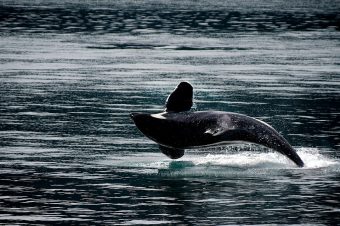Russian authorities have announced that they will release all 97 whales currently being held captive in the country’s Far East.

The whales made news in November last year when an aerial drone video showed several of them cramped inside small, rectangular sea pens at Srednyaya Bay, with very little space to move around. Labeling the enclosures a “whale jail,” local media estimated there were some 90 belugas (Delphinapterus leucas) and 11 killer whales or orcas (Orcinus orca) being held there, caught by four companies in all. Activists and whale conservationists alleged the companies had obtained the whales illegally with plans to sell them to Chinese aquariums and amusement parks.
On April 8, Oleg Kozhemyako, the governor of the Primorski region, Jean-Michel Cousteau, president of the U.S-based nonprofit Ocean Futures Society, and Charles Vinick, executive director of the nonprofit The Whale Sanctuary Project, signed a joint statement agreeing to release all the captive belugas and orcas back into their natural environment.
“Scientists, including both Russian and international scientists from the Cousteau Team, will continue to evaluate the animals to determine when and how to release them,” the statement says. “Until then, we will immediately begin work so that the cetaceans are held in conditions most like their natural environment. We also expect that a rehabilitation center will be created for those animals that are injured in wild nature and that need to be rehabilitated.”
In a press conference, Kozhemyako said the whales couldn’t have been released in winter. “Had we done it all the animals would have died,” he said, adding that the whales will now be released after proper evaluation of their state of health. “I will try my best to have all our work be as open and transparent as possible,” Kozhemyako said.
Cousteau said each individual whale was different, and could take a different length of time to readapt to the natural environment as a result. “Majority, if not all, will be released where they were captured, so they can be reconnected, we hope … potentially with some of their families or their groups,” he said. “It’s not easy but it’s going to happen hopefully for most of them.”
Some of the captive whales appear to be in poor health, whale experts say. In March this year, 34 marine scientists from across the world sent a letter to the office of Russian President Vladimir Putin expressing concern over the condition of the whales. Photos of at least one orca taken 42 days apart show that its health and well-being is deteriorating rapidly, the biologists wrote. “Additionally, at least one orca and several white whales [belugas] are reportedly missing and, although the captors claim these animals escaped the pens, given their young ages and their poor condition, we are concerned that they may actually have died.”
Many of the captive belugas are babies, other experts told National Geographic, likely captured before they had been weaned off their mother’s milk. The cramped, icy condition of the pens is also distressing for the animals, and several whales have skin lesions resulting from frostbite or microbial infections.
Following public outrage and appeals by Hollywood celebrities, Russian authorities launched an investigation in February, charging the four companies with illegally capturing and confining the whales. Under the 1982 international moratorium on commercial whaling, whales may be captured only for research and educational purposes. Commercial export of whales is illegal, but whales can reportedly sell for millions of dollars on the Chinese black market.
Source: Mongabay



